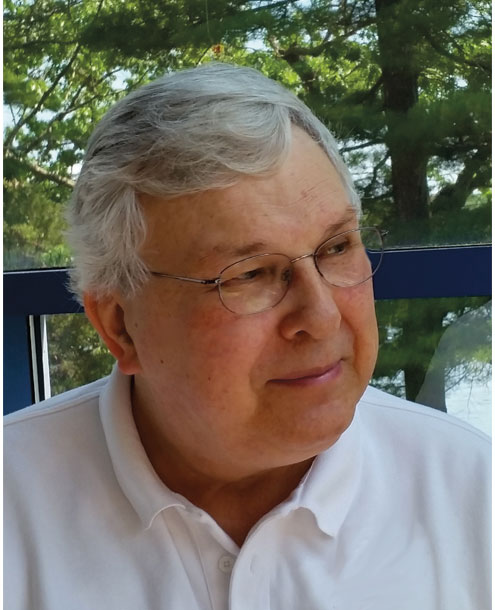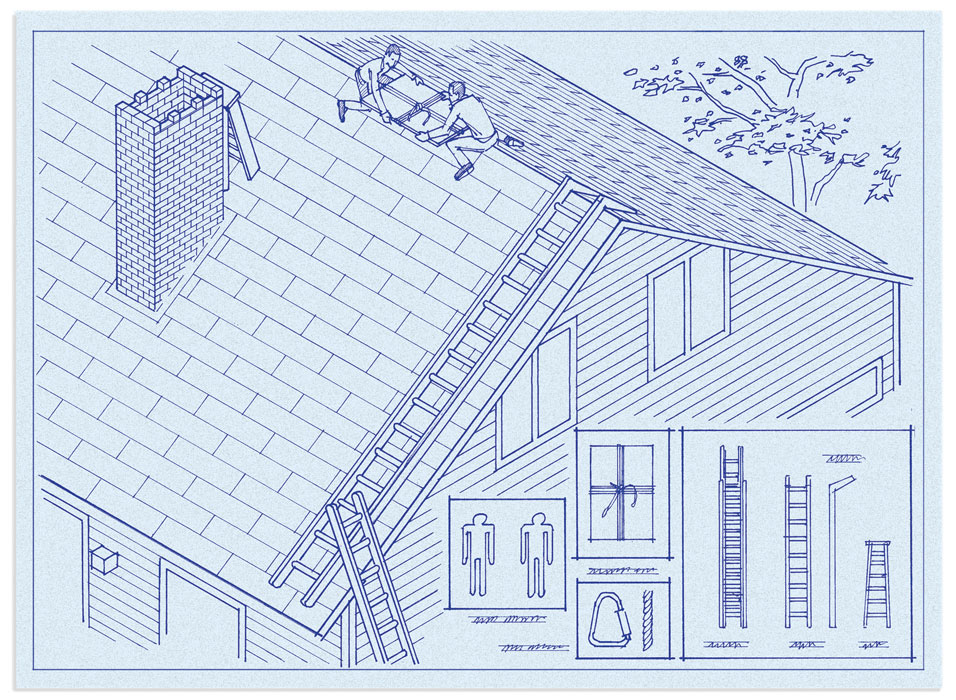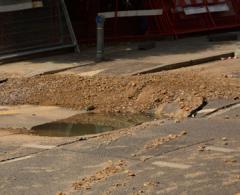
This Article From Issue
November-December 2023
Volume 111, Number 6
Page 323

Courtesy of Catherine Petroski
To the Editors:
I was the editor-in-chief of American Scientist when Henry Petroski wrote his first Engineering column in the January–February 1991 issue. I had read and been impressed by his book To Engineer Is Human (St. Martin’s Press, 1985). I really wanted to get more coverage of technology into the magazine, so I approached him about becoming a regular columnist. Henry was a little bit of a hard sell; he worried that having his work in the magazine would reduce sales of his books. But obviously he came around. Henry was such a reliable columnist—he always turned in clean copy on time.
One day in the 1990s, we met for lunch. He had just published yet another book. I was grumbling about the slow pace of progress on my own first book. Henry observed: “When I first thought about writing a book, it seemed intimidating. But then I sat down and did the math. If you just get up every morning and write a thousand words, books get finished quickly enough.” Clearly, he was a man who took his own advice. I’ve always wished that I could have followed his example.
Brian Hayes
Chapel Hill, NC
To the Editors:
I was delighted to see Henry Petroski’s final column in the July–August issue (“Building Knowledge”), and so sorry to learn he had passed on. He and I were classmates at Manhattan College. I saw him once at a reunion and we joked that at the time American Scientist had two columnists from Manhattan College. I miss him.
Peter Denning
Salinas, CA
To the Editors:
Thanks for your extensive and insightful essay about Henry Petroski. It is to his essay that I turned when I got a new edition of American Scientist. His prose was so clear and declarative. Henry’s subjects were varied and always engaging. I and many readers will miss him.
Bob Chianese
Ventura, CA
To the Editors:
I am one of Sigma Xi’s oldest members (since 1961, and I recently turned 91—and still working), and I’ve known Henry since 1985. He was hugely important in my professional life, right up there with my meeting with Albert Einstein.
On two occasions in the 1990s, I invited Henry to keynote a conference I was running—one on computer system trustworthiness and one on software engineering. In each case, his keynote made an enormous contribution to the entire conference. We had various ongoing communications, including discussions relating to his American Scientist columns. I submitted the following cover encomium for his last book, Force (Yale University Press, 2022):
Henry Petroski is a true polymath with a superbly holistic perspective. This book is a unified field theory of almost everything, exploring the interdependencies among everyday forces and their effects. Albert Einstein would have loved it.
Peter G. Neumann
Palo Alto, CA
To the Editors:
Indeed, we shall all miss Henry Petroski and his Engineering columns very much! My favorite (not surprisingly) dealt with bridges made of unconventional materials, including frozen tomatoes (“Frozen Tomatoes and Other Construction Materials,” May–June 2022). Henry was kind enough to credit me by name with the germ of that idea, which derives from the only joke my late Uncle Roy knew: Why is an old maid like a frozen tomato? Because it’s hard ter-mate-er.
I had last emailed him a question about friction prompted by his column, “The Push and Pull of Friction” (November–December 2022). My question went unanswered, as did my final suggestion for a column on “Bridges in Song and Story”—the well-designed (The Bridge on the River Kwai) and poorly designed (“London Bridge Is Falling Down”); the judgmental (The Bridge of San Luis Rey) and the nonjudgmental (“Bridge over Troubled Water”). I suppose I shall have to write that one myself some day!
Virginia Trimble
Irvine, CA
To the Editors:
I was so sorry to hear that Henry Petroski passed away. I always read and enjoyed his excellent articles on various engineering projects. I contacted him a number of times—most recently last year to share my experiences. He always responded to my emails. I will greatly miss him.
Joseph A. Castellano
San Jose, CA
To the Editors:
I am so sorry to read that Henry Petroski has passed. I was an avid reader of his American Scientist columns, as well as his books.
The two of us corresponded frequently on a wide range of subjects. We were like minds—curious and interested in virtually everything we saw around us. We had other things in common—we were both Manhattan College graduates, and we reminisced about our times there.
I am chemically- and mechanically-minded and he was soundly structural, but as soon as I heard about the Florida condo collapse (June 24, 2021), I thought of the salt air corrosion of rebar, and the expansion cracking of concrete on the columns. Henry bravely wrote a piece on the subject before studies were completed (“What Lessons Will Be Learned from the Florida Condo Collapse?” September–October 2021), and those factors were high on his list of likely causes.
He also wrote a more lighthearted piece on pesky light switches (“Solving Failures Around the House,” January–February 2020). I wrote him a follow-up email to that article, sharing a clue to the issues he faced—switches that do not have “off” and “on” written on them are the three-way type. And so on as we wrote back and forth over the years.
Thomas F. McGowan
Atlanta, GA

Tom Dunne
To the Editors:
Like many readers of Henry Petroski’s column, especially those of us professional engineers, I was deeply saddened to hear about his passing.
As an American Scientist subscriber and reader of his books, I have greatly enjoyed and learned a lot from Henry’s insights. I wrote him an email once about my views on the philosophical aspects of practicing engineering. He wrote back within 24 hours with a very positive response. That was most appreciated as I’m sure he received many emails on engineering topics.
David Shteinman
Castlecrag, NSW, Australia
To the Editors:
I am a retired university professor and a physician. My undergraduate degree was in chemistry, not engineering. But I earned a PhD in engineering (industrial, not mechanical) at age 60 and taught it (as well as medicine) for 10 years prior to retiring. One of my combined passions in engineering and medicine was quality and safety, and that was my connection with Henry Petroski. I read all of his books and all of his columns in American Scientist.
Although I never met him, I always felt that we were “kin.” I will look forward to future articles in American Scientist, but it will most certainly be different without him. I join the many who will deeply miss him.
Peter J. Fabri
Tampa, FL
To the Editors:
I was very sorry to learn of the passing of Henry Petroski. His column was my favorite in your magazine, and whenever I received a new issue I would quickly turn to Engineering and read it first. In 2017, I wrote a letter to the magazine in response to his article about the slide rule (“Slide Rules: Gone but Not Forgotten,” May–June 2017), relating my own experiences with slide rules, electronic calculators, and pocket calculators.
As you mentioned in your In Memoriam article, he will be sorely missed, and you have made the right decision in retiring the Engineering column in his honor.
Henry C. Brenner
New York, NY
To the Editors:
Henry Petroski’s columns were always the highlight of my reading in each issue of American Scientist. You are right to retire the Engineering column in his honor. His remarkable contributions will be sorely missed by many, including me.
Forman Williams
La Jolla, CA
To the Editors:
I was quite saddened to read today that Henry Petroski had passed away. His column was the one I immediately turned to when I received the latest issue of American Scientist. As a native of Brooklyn, his article on the Brooklyn Bridge was particularly exciting (“Altering an Icon,” January–February). I’m very sad to see him go.
Paul Goldberg
Boston, MA
To the Editors:
Thank you for remembering Henry Petroski in the September–October issue of American Scientist. I always looked forward to Henry’s columns, and I have read and enjoyed many of his books. I corresponded with him twice: once about his article on newspaper folding (“Industrial Origami,” January–February 2005) and once concerning his article on the history and design of can openers (“Bottle and Can Openers as Levers,” March–April 2017). In both instances, I received a personal and pertinent written reply.
Joe S. Herring
Rockport, TX

American Scientist Comments and Discussion
To discuss our articles or comment on them, please share them and tag American Scientist on social media platforms. Here are links to our profiles on Twitter, Facebook, and LinkedIn.
If we re-share your post, we will moderate comments/discussion following our comments policy.